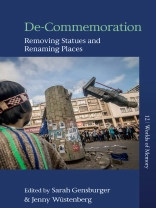In the wake of recent protests against police violence and racism, calls to dismantle problematic memorials have reverberated around the globe. This is not a new phenomenon, however, nor is it limited to the Western world. De-Commemoration focuses on the concept of de-commemoration as it relates to remembrance. Drawing on research from experts on memory dynamics across various disciplines, this extensive collection seeks to make sense of the current state of de-commemoration as it transforms contemporary societies around the world.
Jadual kandungan
List of Illustrations
Acknowledgments
Introduction: Making Sense of De-Commemoration
Sarah Gensburger and Jenny Wüstenberg
Part I: De-Commemoration after Regime Change
Chapter 1. Baptizing and Unbaptizing in Algeria: From French Colonization to National Independence
Amar Mohand-Amer
Chapter 2. Street Renaming in Postsocialist Romania: A Quantitative Analysis of Toponymic Change
Mihai Stelian Rusu
Chapter 3. “The First Bolshevik Leaves Riga”: The De-Commemoration of Vladimir I. Lenin in Riga, Latvia (1987–1991)
Dmitrijs Andrejevs
Chapter 4. “In Memory of the Fallen…” But for How Long? The De-Commemoration of German War Memorials in Poland after 1945
Karolina �wiek-Rogalska
Chapter 5. Naming to Erase, Renaming to Restore: (Re)Indigenizing the Landscape
Kerri J. Malloy
Chapter 6. Removing Rhodes from His Pedestal: De-Commemoration in Postcolonial South Africa
Gary Baines
Chapter 7. Contrasting Fates of Lenin Statues in Ukraine and Russia
Dominique Colas
Chapter 8. Beyond the Monument: Unmaking the Valley of the Fallen in Contemporary Spain
Francisco Ferrándiz
Part II: De-Commemoration and Societal Transformation
Chapter 9. Renaming and the Relationship between Colonized and Colonizer: The Role of Commemoration within Dual Place Names in New Zealand
Taylor Annabell
Chapter 10. De-Canonization of the Soviet Past: Abject, Kitsch, and Memory
Yuliya Yurchuk
Chapter 11. Diversifying Public Commemorations in Cape Town and Copenhagen
Vibe Nielsen
Chapter 12. De-Commemoration as Healing and Conflict: Canada and Its Colonial Past and Present
Kate Korycki
Chapter 13. Killing Pedro de Valdivia Again: De-Commemoration of the Past and De-Neoliberalization of the Present during the 2019–2020 Chilean Revolt
Manuela Badilla and Carolina Aguilera
Chapter 14. De-Commemorating Sound: Controversies about the Reestablishment of the National Anthem in South Korea and Beyond
Bae Myo-Jung
Chapter 15. Do Commemorations Have an “Expiration Date”? A Case Study from Belgium
Nicolas Moll
Part III: De-Commemoration to Propel Change
Chapter 16. De-Commemorating Australian Settler Colonialism
Sarah Maddison
Chapter 17. The Present Is All That Matters: De-Commemoration Practices in Israel
Tracy Adams and Yinon Guttel-Klein
Chapter 18. De-Commemorations and the Unsettled Past in Contemporary Brazil
Ricardo Santhiago
Chapter 19. Decolonizing Colonial Monuments: Counter-Memory Activism in Madrid and Barcelona
Fabiola Arellano Cruz
Chapter 20. Transnational Memory Struggles: Guerrilla Remembrances in Colombia and Venezuela in the 2000s
Jimena Perry
Chapter 21. “Next Stop Anton-Wilhelm-Amo Strasse”: Place Names, De-Commemoration, and Memory Activism in Berlin
Duane Jethro and Samuel Merrill
Chapter 22. From Decapitation to Destruction: Making Sense of Toppling Statues in Contemporary Martinique
Audrey Célestine, Valérie-Ann Edmond-Mariette, and Zaka Toto
Chapter 23. De-Commemoration in Great Britain
Stephen Small
Chapter 24. The Role of Nonprofits in De-Commemoration: The Southern Poverty Law Center’s Whose Heritage? Report
Seth Levi and Kimberly Probulus
Part IV: De-Commemoration as Smoke Screen
Chapter 25. De-Commemoration without Decolonization? The Peculiar Case of the Philippines
Lila Ramos Shahani
Chapter 26. Twice Removed: The Mystery of Manila’s Missing Comfort Woman Monument
Catherine Lianza Aquino and Jocelyn S. Martin
Chapter 27. Counter-Memory and State De-Commemoration: The Khavaran Mass Grave in Iran
Chowra Makaremi
Chapter 28. The Toppling of the Equestrian Statue and the Future of Colonial-Era Memorials in Namibia
Vilho Amukwaya Shigwedha
Chapter 29. An Unmarked Rebellion: The Politics of Forgetting Denmark Vesey
Vanessa Lynn Lovelace and Jamie Huff
Chapter 30. Exploring the Scope of De-Commemoration: Touring Trafalgar Square in London and Beyond
Stuart Burch
Part V: De-Commemoration to Challenge Memory
Chapter 31. From De-Commemoration of Names to Reparative Namescapes: Geographical Case Studies in the United States
Jordan P. Brasher and Derek Alderman
Chapter 32. De-Commemoration under the Law: The Removal of Statues in France and the United States
Thomas Hochmann
Chapter 33. Human Rights and Toppled Statues: Can the European Convention on Human Rights Provide Solutions to De-Commemoration Disputes?
Tom Lewis
Chapter 34. Re-Commemoration: What Other Stories Can We Tell? Observing Ordinary People Engaging with Monuments in Public Space
Alison Atkinson-Phillips
Chapter 35. Who Cares about Old Statues and Street Names? Resisting Change and the Protracted Decommunization of Public Space in Poland
Ewa Ochman
Chapter 36. Keeping the Past from Freezing: Augmented Reality and Memories in the Public Space
Mykola Makhortykh and Anna Menyhért
Chapter 37. De-Commemorating White Supremacy through the Act of Voting
Lorena Chambers
Index
Mengenai Pengarang
Jenny Wüstenberg is Professor of History & Memory Studies at Nottingham Trent University. She is the founder and past Co-President of the Memory Studies Association (2016-2023), as well as Chair of the COST Action on “Slow Memory: Transformative Practices in Times of Uneven and Accelerating Change” (2021-2025). She is the author of Civil Society and Memory in Postwar Germany (Cambridge University Press, 2017) and the co-editor, most recently, of Agency in Transnational Memory Politics (with Aline Sierp, Berghahn 2020) and the Routledge Handbook of Memory Activism (with Yifat Gutman, 2023).












